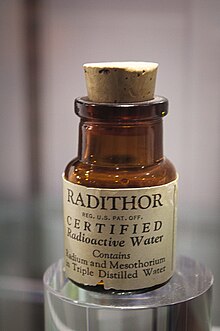Radithor was a patent medicine that is a well-known example of radioactive quackery and specifically of excessively broad and pseudoscientific application of the principle of radiation hormesis. It consisted of triple-distilled water containing at a minimum 1 microcurie (37 kBq) each of the radium 226 and 228 isotopes.

The time of Radithor and radioactive elixirs ended in 1932, with the premature death of one of its most fervent users, Eben Byers, an American golfer. This history led to the strengthening of regulatory control of pharmaceutical and radioactive products.
Radithor was manufactured from 1918 to 1928 by the Bailey Radium Laboratories of East Orange, New Jersey. The owner of the company and head of the laboratories was listed as William J. A. Bailey, a dropout from Harvard College,[1] who was not a medical doctor.[2] It was advertised as "A Cure for the Living Dead"[3] as well as "Perpetual Sunshine". The expensive product was claimed to cure impotence among other ills.[4]
Eben Byers, a wealthy American socialite, athlete, industrialist, and Yale College graduate, died in 1932 of various cancers as a result of Radithor use.[5] Byers was buried in a lead-lined coffin; when exhumed in 1965 for study, his remains were still radioactive and measured at 225,000 becquerels.[4] As a comparison, the roughly 0.0169 g of potassium-40 present in a typical human body produces approximately 4,400 becquerels.[6]
Byers's death led to the strengthening of the Food and Drug Administration's powers and the demise of most radiation-based patent medicines. A Wall Street Journal article describing the Byers incident (published in August 1990) was titled "The Radium Water Worked Fine Until His Jaw Came Off".[7]
Federal and local agencies, as well as medical authorities in various parts of the country, were stirred to action yesterday as a result of the death of Eben M. Byers, wealthy Pittsburgh steel manufacturer and sportsman, who died here Wednesday at the Doctors' Hospital from causes attributed to radium poisoning resulting from the drinking of water containing radium in solution. ...